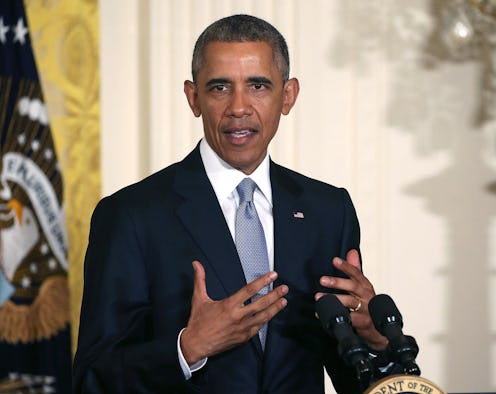As part of a Vice special, President Obama will visit El Reno federal prison in Oklahoma to shed light on America's criminal justice system. Obama will soon become the first sitting U.S. president to visit a federal prison, and the special — which will air on HBO in the fall — will include interviews with Obama himself as well as with prisoners, law enforcement officials, and El Reno staff.
This is certainly not the first time Obama has talked about criminal justice and mass incarceration, and on Monday, he commuted the sentences of dozens of nonviolent drug offenders. But spurred on in part by the War on Drugs, incarceration rates have risen 700 percent in the last 40 years even as crime rates have dropped, with people of color and LGBTQ people being disproportionately affected. Hopefully, the Vice special will touch on the difficulties faced by marginalized groups in prison and address how the War on Drugs has contributed to mass incarceration. In the meantime, as we wait for details of Obama's visit to El Reno to emerge, here are a couple of things things you can do to prepare for the special.
Read Michelle Alexander's The New Jim Crow: Mass Incarceration In The Age of Colorblindness
Alexander is a civil rights litigator and legal scholar whose book, The New Jim Crow, takes a frank look at the especially high incarceration rates of black males as a result, at least in part, of the War On Drugs. She describes mass incarceration as a "racial caste system" that is essentially a contemporary version of the Jim Crow laws, and reflects on the negative impact of incarceration.
We could choose to be a nation that extends care, compassion, and concern to those who are locked up and locked out or headed for prison before they are old enough to vote. We could seek for them the same opportunities we seek for our own children; we could treat them like one of "us." We could do that. Or we can choose to be a nation that shames and blames its most vulnerable, affixes badges of dishonor upon them at young ages, and then relegates them to a permanent second-class status for life. That is the path we have chosen, and it leads to a familiar place.
Take A Look At Obama's Track Record On Criminal Justice
In his State of the Union address in January, Obama called for bipartisan criminal justice reform by referencing incidents of police brutality and incarceration rates. As mentioned above, he also announced that he would commute the sentences of numerous nonviolent drug offenders. But despite his constant appeals for change, Obama rarely addresses the #BlackLivesMatter movement or actively works to end the War on Drugs. Individual commutations are an important start, but there have been fewer than 100 during his administration, most of which happened during his second term. During the special, pay close attention to see if Obama talks about the intersections of race, gender, and other axes of identity with incarceration rates, and whether or not he addresses the systemic repercussions of mass incarceration.
It is significant that America's first black president is also the first sitting president to visit a federal prison. If we're lucky, Obama will use this interview as an opportunity to discuss what Alexander calls the "racial caste system" that is America's criminal justice system and address the abuse and lack of resources that many prisoners face.
Image: Getty Images (2)
